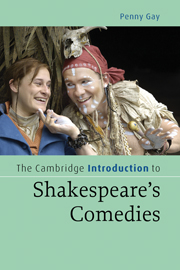Book contents
Conclusion
Published online by Cambridge University Press: 05 September 2012
Summary
Improbable fictions
In many of the plays we have looked at in this book Shakespeare takes an opportunity to theorise, to draw attention to the intellectual and cultural work that is being done at this moment on the stage. Regularly in the comedies (much more so than in the tragedies or histories) the audience is reminded of the artificiality of what is going on on stage; the responsibility is thrown upon us to think, not only about the story, but about its telling, about the human need to make and listen to stories.
Perhaps the most famous instance of this practice is the throw-away line by a minor character, Fabian, in Twelfth Night 3.4.109: ‘If this were played upon a stage now, I could condemn it as an improbable fiction’ – the ‘this’ in question being Malvolio's transformation into a clown-like parody of a lover. Like Feste, Fabian – who might be thought of as a Shakespearean clown-in-training – speaks wisdom lightly. An improbable fiction is exactly what comedy is, at base. The world is not often so kind to us as to produce happy endings out of errors, coincidences, wrong choices in love, miscommunications. Social and political structures do not always guarantee the success of the good-hearted. Nevertheless, we need the ‘fictions’ that tell us that sometimes
Jack shall have Jill,
Naught shall go ill,
The man shall have his mare again, and all shall be well
– as Puck chants when waking and restoring Lysander to his former love after the midsummer night's dream of irrational desire and pursuit (Dream 3.2.461–3).
- Type
- Chapter
- Information
- The Cambridge Introduction to Shakespeare's Comedies , pp. 138 - 140Publisher: Cambridge University PressPrint publication year: 2008

